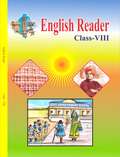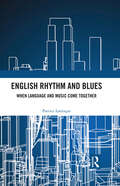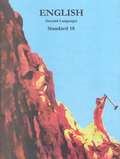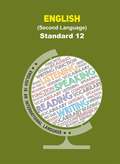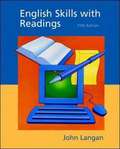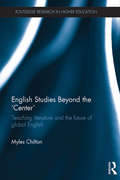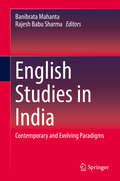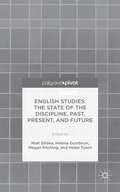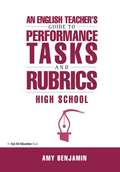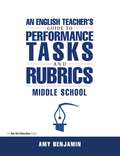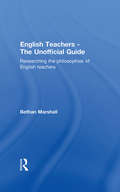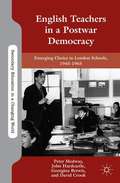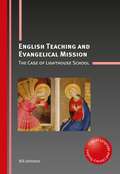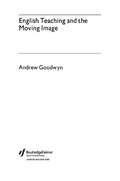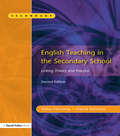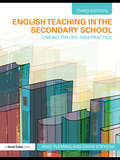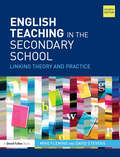- Table View
- List View
English Reader class 8 - S.C.E.R.T. Raipur - Chhattisgarh Board
by Raipur C. G. Rajya Shaikshik Anusandhan Aur Prashikshan ParishadEnglish Reader text book for 8th standard from State Council of Educational Research & Training, Raipur, C.G. in English.
English Rhythm and Blues: Where Language and Music Come Together
by Patrice Paul LarroquePatrice Larroque hypothesizes that early blues singers may have been influenced by the trochaic rhythm of English. English is stressed and timed, which means that there is a regular beat to the language, just like there is a beat in a blues song. This regular beat falls on important words in the sentence and unimportant ones do not get stressed. They are “squeezed” between the salient words to keep the rhythm. The apparent contradiction between the fundamentally trochaic rhythm of spoken English and the syncopated ternary rhythm of blues may be resolved as the stressed syllables of the trochee (a stressed-unstressed sequence) is naturally lengthened and assumes the role of one strongly and one weakly stressed syllable in a ternary rhythm. The book suggests investigating the rhythm of English and the rhythm of blues in order to show how the linguistic rhythm of a culture can be reflected in the rhythm of its music.
English Second Language Semester 1 class 6 - GSTB
by Rakesh Patel Chhaya Upadhyay Rajeshree Tatel Sangeeta Khuman Salim Vora Maheshgar Goswami Rakesh Parmar Koushik Parmar Karshan Desai Suresh Desai Puskar Makwana.આ પુસ્તક ધોરણ ૬ નું અંગ્રેજી વિષય પ્રથમ સત્ર નું પાઠ્યપુસ્તક છે .
English Second Language Semester 1 class 7 -GSTB
by Rakesh Patel Rajeshree Tandel Salim Vhora Rakesh Parmar Karsan Desai Pushkar Makwana Chhaya Upadhyay Sangita Khuman Maheshgar Goswami Kaushik Parmar Suresh Desaiઆ પુસ્તક ધોરણ 7 નું વિષય અંગ્રેજી વિષય (પહેલું સત્ર ) નું પાઠ્યપુસ્તક છે
English Semester 2 class 7 - GSTB
by Rakesh Patel Rakesh Parmar Salim Vohra Pushkar Makwana Robinson Roy Bhavesh Thakar Rajeshree Trollઆ પાઠયપુસ્તકોમાં આપવામાં આવેલી પ્રવૃત્તિઓ એવી રીતે યોજવામાં આવી છે કે જોધી પ્રવૃત્તિ પછી એ અંગે ચર્ચા અથવા ચિંતન થાય , પ્રસ્તુત પાઠ્યપુસ્તક ધોરણ ૭ ના અંગ્રેજી વિષય ના બીજા સત્ર નું છે જેમાં ૫ યુનિય છે પુનરાવર્તન અને પરિશિષ્ટ પણ આપેલ છે.
English Semester 2 class 6 - GSTB
by Rakesh Patel Maheshgar Goswami Rakesh Parmar Salim Vohra Pushkar Makwana Robinson Roy Bhavesh Thakar Kaushik Parmar Himanshu Rajput Vishwajeet Yadav Rohit Hairland Rajeshree Troll Sangeeta Khumna Stevens Royઆ પાઠયપુસ્તકોમાં આપવામાં આવેલી પ્રવૃત્તિઓ એવી રીતે યોજવામાં આવી છે કે જોધી પ્રવૃત્તિ પછી એ અંગે ચર્ચા અથવા ચિંતન ધાય, ઉપયોજન થાય અને શું શીખ્યા એ પણ તારવી શકાય. બાળકોને અવારનવાર વ્યક્તિગત રીતે તેમજ સામૂર્ષિક રીતે નાનાં કે મોટાજૂથમાં કામ કરવાનો ભણવાનો અવસર મળે. પાઠ્યપુસ્તક માં ૫ યુનિટ આપેલ છે.
English Semester 2 class 8 - GSTB
by Rakesh Patel Maheshgar Goswami Rakesh Parmar Rajeshree Toddle Salim Hora Krishna Desai Pushkar Makwana Robinson Roy Bhavesh Thakar Shadow remedies Sangeeta Khumna Kaushik Parmar Himanshu Rajput Stevenson Roy Vishwajeet Yadav Rohit Hairlandઆ પાઠયપુસ્તકોમાં આપવામાં આવેલી પ્રવૃત્તિઓ એવી રીતે યોજવામાં આવી છે કે જોધી પ્રવૃત્તિ પછી એ અંગે ચર્ચા અથવા ચિંતન થાય , પ્રસ્તુત પાઠ્યપુસ્તક ધોરણ ૮ ના અંગ્રેજી વિષય ના બીજા સત્ર નું છે જેમાં ૫ યુનિય છે પુનરાવર્તન અને પરિશિષ્ટ પણ આપેલ છે.
English Skills with Readings (Fifth Edition)
by John LanganEnglish Skills with Readings will help students learn and apply the basic principles of effective composition. It will also help them master essential reading skills. It is a nuts-and-bolts book based on a number of assumptions or beliefs about the writing process.
English Solutions for all FAL Grade 1 Learner's Book
by Jenny GardnerEnglish Solutions for all FAL Grade 1 Learner's Book
English Studies Beyond the 'Center': Teaching literature and the future of global English (Routledge Research in Higher Education)
by Myles ChiltonThis book addresses the shape of English studies beyond the ‘center’ by analyzing how the discipline has developed, and by considering how lessons from this analysis relate to the discipline as a whole. The book aims to open a cross-disciplinary conversation about the nature of the English major in both non-Anglophone and Anglophone countries by addressing the tensions between language and literature pedagogy, the relevance of a focus on hyper-canonical Anglophone literature in a world of global Englishes, world literature, and multilingual students, and by reflecting on the necessary contingency and cross-purposes of blended literature and language classrooms. Many of the book’s points of discussion arise from the author’s experience as an English professor in Japan, where the particularities of English language and literature pedagogy raise significant challenges to Anglo-centric critical and pedagogical assumptions. English Studies Beyond the ‘Center’: Teaching Literature and the Future of Global English therefore argues that English literature must make a case for itself by understanding its place in a newly configured discipline. Issues discussed in the book include: English language and literature pedagogy in Japan The modes through which EFL and English literary studies converge and diverge Globalized English beyond the Anglo-American perspective English classroom practices, particularly in Japan
English Studies in India: Contemporary And Evolving Paradigms
by Banibrata Mahanta Rajesh Babu SharmaThis volume is a collection of scholarly papers that explore the complex issues concerning English Studies in the present Indian context. The discussions in this volume range from historical perspectives to classroom-specific pedagogies, from sociological and political hierarchies to the dynamics of intellectual development in the English language environment. Interrogating both policy and practice pertaining to English Studies in the context of Indian society, culture, history, literature and governance, the chapters seek to formulate contemporary perspectives to these debates and envision alternative possibilities. Since the introduction of English to India more than 2 centuries ago, the language has transmuted the very fabric of Indian society, culture, history, literature and governance. The idea of India cannot be conceived in its entirety without taking into consideration the epistemological role that English has played in its formation. The present globalized world order has added dimensions to English Studies which are radically different from those of India’s colonial and postcolonial past. It is therefore imperative that the multitudinous shades and shadows of the discipline be re-examined with inputs drawn from the present context. This volume is for scholars and researchers of English literature and language studies, linguistics, and culture studies, and others interested in exploring new paradigms of engagement with the disciplinary formulation of English Studies in India.
English Studies: The State of the Discipline, Past, Present, and Future
by Niall Gildea Helena Goodwyn Megan Kitching Helen TysonAn accessible and wide-ranging consideration of concerns facing English Studies in its surrounding context of the university and society. The contributors to this volume seek to trace, in the face of current challenges, historical and contemporary debates surrounding English Studies.
English Teacher's Guide to Performance Tasks and Rubrics: High School
by Amy BenjaminThis book provides step-by-step procedures, student hand-outs, and samples of student work.
English Teacher's Guide to Performance Tasks and Rubrics: Middle School
by Amy BenjaminThis book provides step-by-step procedures, student hand-outs, and samples of student work.
English Teachers - The Unofficial Guide: Researching the Philosophies of English Teachers
by Bethan MarshallBethan Marshall traces the competing traditions of English teaching and considers their relevance to the current debate through an analysis of English teachers' views about themselves and their subject. The findings are based on a highly original research method in which teachers were asked to respond to and comment upon five different descriptions of their approaches to English teaching.English Teachers - The Unofficial Guide:*contextualises current debates about English teaching within the subject's contested history*provides a vehicle for teachers to reflect on their own practice and locate themselves within the debate*opens up the debate on assessment practices within English teaching.
English Teachers in a Postwar Democracy
by David Crook Peter Medway John Hardcastle Georgina BrewisConflicting conservative and radical impulses in English society after WWII were played out in microcosm in education. They particularly shaped English teaching, examined in three post-war London schools in a detailed study that uses oral history--interviews with former teachers and students--and documents including mark books and students' work.
English Teaching and Evangelical Mission: The Case of Lighthouse School
by Bill JohnstonDebates about the place of mission work in English Language Teaching continue to rage, and yet full-length studies of what really happens at the intersection of ELT and evangelical Christianity are rare. In this book, Johnston conducts a detailed ethnography of an evangelical language school in Poland, looking at its Bible-based curriculum, and analyzing interaction in classes for adults. He also explores the idea of ‘relationship’ in the context of the school and its mission activity, and more broadly the cultural encounter between North American evangelicalism and Polish Catholicism. The book comprises an in-depth examination of a key issue facing TEFL in the 21st century, and will be of interest to all practitioners and scholars in the field, whatever their position on this topic.
English Teaching and the Moving Image
by Andrew GoodwynAndrew Goodwyn's straightforward approach to teaching about the moving image de-mystifies this topic and shows how it can be easily incorporated into classroom practice. The first of its kind, this book builds on teachers' knowledge of teaching about advertising, newspapers and visual adaptations of literary texts, and provides practical advice and guidance on: * Adaptations: not just the film of the book* Teaching film* Teaching television* Practical work* New technologies and the moving audience. This jargon-free book will be a stimulating and useful guide to teachers and student teachers looking to improve their knowledge of the moving image and its recent arrival in secondary school teaching.
English Teaching in the Secondary School 2/e: Linking Theory and Practice
by Mike Fleming David StevensPresenting an informed view of current educational policy, this text encourages students of secondary English to take a creative and independent interpretation of government initiatives in order to achieve effective teaching practice. It provides a good balance of theoretical material with practical ideas for application in the classroom and strongly encourages reflection and critical thought. This new edition includes: coverage of the National Curriculum 2000, the National Literacy Strategy and the new Key Stage 3 Strategy a new chapter on how to teach ICT a new chapter on Inclusion – including differentiation, cultural diversity, EAL and teaching across the ability range new material on how to teach Shakespeare an introduction to cross-curricular themes – such as citizenship, and social, moral and spiritual values. Written in an accessible and conversational style, this text poses an excellent degree of challenge for all students on initial teacher training courses.
English Teaching in the Secondary School: Linking Theory and Practice
by Mike Fleming David StevensNow in an updated third edition, English Teaching in the Secondary School is a comprehensive guide to the theory and practice of teaching English. Presenting an informed view of current educational policy, the authors provide advice to help students creatively and independently interpret government initiatives and incorporate them in their teaching practice. With practical ideas for use in the classroom, extensive discussion of theory and opportunities for reflection and critical thought, the authors guide students through the whole process of English teaching in the secondary school. Fully updated to include: a chapter on research and writing for M Level students references to the Every Child Matters agenda updates to the KS3 and 14-19 curriculum revised GCSE specifications an emphasis on creativity, flexibility and learner engagement the impact of globalisation and technology on literacy. Written in an accessible style, with a wealth of advice and ideas, this book forms essential reading for practising teachers, lecturers, PGCE students and those undertaking initial teacher training, and is suitable for those engaging in M Level study.
English Teaching in the Secondary School: Linking theory and practice
by Mike Fleming David StevensEnglish Teaching in the Secondary School is a comprehensive guide to the theory and practice of teaching English. This updated 4th edition has been revised to take into consideration changes in national policy, drawing on the most recent research and theory to produce engaging, practical ideas for use in the classroom. It challenges mechanistic and formulaic approaches to teaching, instead placing an emphasis on reflection, understanding and informed practice. Guiding students and new teachers through the whole process of English teaching in the secondary school, this edition has been fully updated to include: • a report of the most recent developments in national policy • discussion of multiple literacies and critical literacy • a new chapter on English as an additional language • a new chapter on cross curricular themes • new sections on approaches to the teaching of grammar • reflections on international developments in language teaching and their relevance • a guide to further reading on resources and research Written in an accessible style, with a wealth of advice and ideas, English Teaching in the Secondary School forms essential reading for all those training to become secondary English teachers.
English Term 1 class 9 - Tamil Nadu Board
by Government TamilnaduThe revised course book for English standard IX is based on the communicative approach which recognizes the importance of developing students’ competence to express them fluently, confidently and appropriately. The syllabus aligns with the recommendations of the National Curriculum Framework 2005. The selection of contents has been determined by the students’ present and future academic and social needs.
